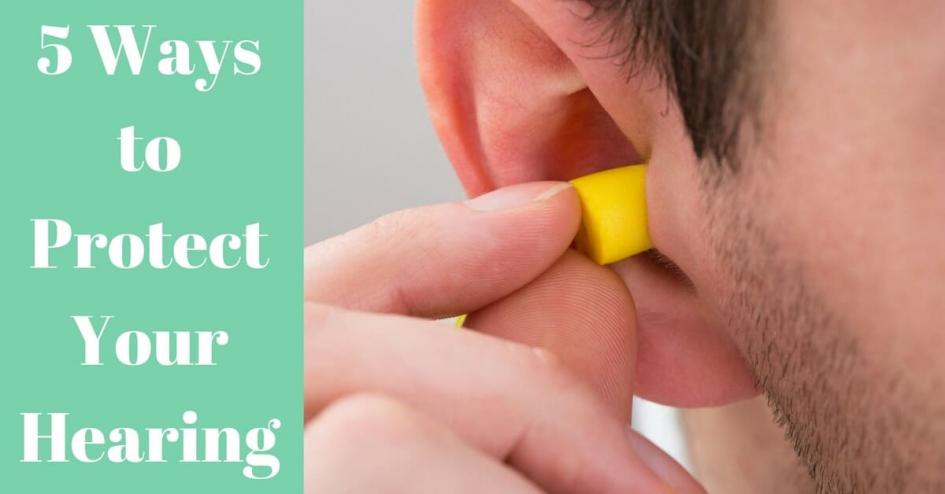
5 Ways to Protect Your Hearing
How to Protect Your Hearing
An estimated 11 million people in the UK experience hearing loss (actionhearingloss.org.uk), but it is important to remember that hearing loss is not just something that comes with getting older. There are things you can actively do to reduce your risk to developing hearing loss.
Noise-induced hearing loss is the second most common form of acquired hearing loss (source). This kind of hearing loss can be caused by either one loud, intense burst of noise or frequent exposure to loud noise over a long period of time.
It isn’t just noise-induced hearing loss that can affect your hearing. Things such as using cotton swabs to clean your ears may put you at risk too.
So, without further ado, here are some easy tips to help you protect your hearing.
-
Use earplugs at work
Using earplugs may seem really obvious, but exposure to loud noises in the workplace can lead to noise-induced hearing loss. In fact, 17,000 people in the UK suffer some kind of ear condition due to excessive noise at work (hse.gov.uk).
Although employers working in environments with, for instance, heavy and loud machinery should provide protective equipment to their employees, noise-induced hearing loss can also be caused by extended exposure to loud noise. It may be, therefore, that an employee does not realise they are at risk of hearing loss.
Play it safe. If you know, or even suspect, that you are likely to be exposed to loud noise, throw some earplugs in your pocket or bag. That goes for concerts and other events too!
-
Stop using cotton swabs
Quite a few people think of cleaning their ears with cotton buds as part of their daily routine, thinking that it helps to remove earwax. However, it is not recommended!
Using cotton buds to remove earwax actually may push earwax further into the ear, which can result in blockages. These blockages can develop into temporary or even permanent conductive hearing loss (hearinglink.org).
There are better – and easier – ways to clean your ears. When in the shower, for instance, let some water into your ear from time to time. Warm, soapy water helps to loosen and soften earwax. That being said, you should ensure that the water leaves your ear after showering to avoid swimmer’s ear. It’s as simple as tilting your head and tugging on your ear lobe to get the water out of your ear.
Your local pharmacy may also be able to provide some eardrops or natural oils, but be sure to speak to your pharmacist before you purchase anything.
For more information, the NHS provides a good overview of common symptoms and treatments for earwax build-up. nhs.uk
-
Turn down the music
The World Health Organization estimates that over 1 billion young people (aged 12-35 years) are at risk of hearing loss due to ‘recreational exposure to loud sounds’.
Use the 60/60 rule: never listen to music at higher than 60% and never for more than 60 minutes a day. In addition, if possible, it is best to use over-the-ear headphones, rather than ear buds, as the latter sit directly next to the eardrum.
-
Tips for concerts and other events
If you are a concert-goer, be sure to stand back from the speakers. The ringing in your ears after you leave is not a memory of good times, but could be a sign of damage!
Finally, give your ears time to recover. According to Deafness Research UK, our ears need 16 hours to recover after about two hours in a nightclub or at a concert. If possible, take a breather and step outside for 5 minutes during the performance or throughout the night.
-
Get regular checkups with hearing professionals
If you wear hearing aids, it is recommended that you should have check-ups every 6 to 12 months for routine preventive cleaning and to check progress.
As hearing loss is a gradual process, it’s a good idea to book in an annual hearing consultation to ensure that you are taking action as soon as signs of hearing loss develop. Untreated hearing loss can have larger impacts upon relationships and the ability to communicate, as well as broader issues such as mental health (ncbi.nim.nih.gov).
Preventive measures can help to stop hearing loss from getting worse, but if you are affected by hearing loss, our team of hearing instrument specialists can assist you in deciphering whether hearing devices are right for you.
House of Hearing
House of Hearing offers hearing care at four centres in Edinburgh, Galashiels, Perth, and St Andrews. Call us on 0131 220 1220 for more information.
House of Hearing Scotland
0131-220-1220
Our Clinics
All House of Hearing clinics are in town centre locations and accessible to public transport and parking. Home visits also available if mobility is an issue.


.png)
.png)
.png)

.png)
